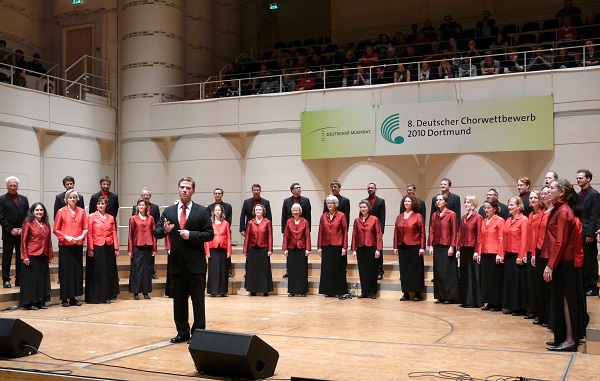8th German Choral Competition, 12-15 May 2010
Walter Vorwerk,
Music Journalist
It is a bit like the Olympic Games: every four years, the German Music Council, a not-for-profit project company for the promotion of musical life in Germany, invites the country’s best choirs to its German Choral Competition. This time it took place in Dortmund, Westphalia, from 12-15 May. Those admitted to participate were already winners, for they had been nominated as the winners of a region (Land). There was a good reason to select Dortmund as the venue. Eight years ago, a choral academy was created here, and with its 1,300 active members it is the biggest singing school in Europe; as a consequence, the city’s cultural programme has been enriched with choral music. In spite of the financial crisis, the city’s cultural budget has not diminished, as was underlined by Mayor Birgit Jörder. Dortmund is also part of the region “Cultural Capital of Europe – RUHR 2010”. The 8th German Choral Competition was therefore held in a context of “superlatives”.
Jürgen Budday, Head of all eleven juries, Board President of the German Choral Competition of the German Music Council and conductor of the Maulbronner Kammerchor, said that he had not imagined that so many choirs would participate. All in all, 132 choirs with about 5,000 singers from all parts of Germany came to Dortmund. This number was a source not only of joy to the organisers, but also of a few problems, because, for financial reasons, the competition had to be reduced to four days only.
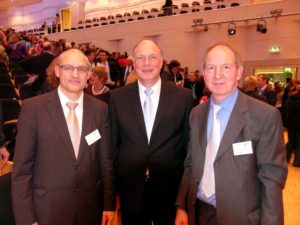
Hans-Willi Hefekäuser, President of Arbeitsgemeinschaft Deutscher Chorverbände (the federation of German choral associations), comprising about 2.5 million singers, is also a Vice-President of the German Music Council and very proud of the competition’s excellent results: “The German Choral Competition is a very special event: proof of the extension, high performance and quality of choral singing in Germany”.
Never had so many prizes been awarded before: fifty-one in all. Only those who organise this kind of event know the effort necessary to make it a success. Since 1993 Helmuth Schubach has been the project leader of this competition and also of the German Music Council orchestra competition. He relies on a large staff of volunteers, on the federal as well as regional basis: “It is a good thing that competitions are also organised on a regional (“Land”) level as e.g. in the ‘Jugend musiziert’ competition. This is a first step towards proving oneself and winning against others in the same category. This means that on the federal level, only the best participate. They also come in order to learn from each other, to get new ideas and take part in a general programme in Dortmund. It is not only for the competition”.
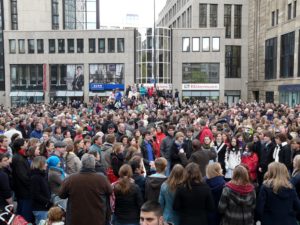
Without doubt, the preparations for the German Choral Competition incite the choirs to work intensely and to strive for the best performance possible. Internationally, the result compares very favourably. One example is the Via-Nova-Chor, Munich, conducted by Florian Helgath, which won first prize in the “Mixed Choirs” category and a special prize for the interpretation of a contemporary piece (“O Domine” by Thomas Jennefeld); another example is the Camerata Musica Limburg male vocal ensemble under Jan Schumacher, selected as the best male chamber choir in Germany. From Berlin came seven ensembles; they obtained two second and two third prizes. It is not possible to name all 51 winners here, and it was not easy for the eleven juries to select the winners of the respective categories.
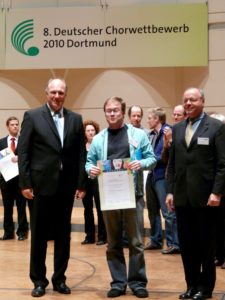
A novelty was the high number of internationally renowned jury members from abroad, in addition to the German experts – they came from Austria, Belgium, Estonia, France, Great Britain, Italy, Poland, Sweden, the USA and Venezuela. “This international character”, says Helmuth Schubach, “shows the international esteem of our work. For instance, the evaluation of vocal jazz ensembles by a representative of the USA is a significant factor. And it is always enriching to have other countries participate in an assessment. The choral conductors appreciate this, especially after our discussions with them after the competition. Many new ideas can be taken home.”
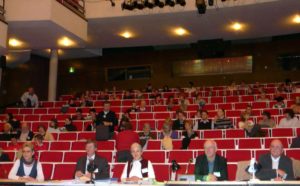
One of the five jury members of the “Mixed Choir – 16-40 Singers” category was María Guinand, a woman sought after worldwide in the field of choral music. She teaches in Caracas, Venezuela, and is the most renowned choral conductor in South America. In the past she has been President and Vice-President of the IFCM, the International Federation for Choral Music, now she is an IFCM Advisor. Regarding her jury work in the German Choral Competition, she says: “I feel very honoured and proud to have been invited to this event. This national German Choral Competition is a very important moment in the life of choral music. It is not only important for Germany; it is a landmark for Europe and other countries. It is exemplary for choral music as a whole. As regards the competition and my participation as a jury member, it is marvellous for me to meet choral experts from Germany and other countries. It is also always a learning process for me to see how excellent German choral directors conduct and build their concert programme. Some of them are internationally active which offers the opportunity to meet them again. The fact that such a competition is organised every four years is also very important for me. And it is interesting to see the approach of many choral conductors in order to ensure participation. I have heard wonderful ensembles with very distinctive sounds, ideas and qualities, and with very interesting programmes of mostly contemporary choral music.
But María Guinand was struck by something else at the German Choral Competition: “I have noticed that many choirs in Germany have a colourful aspect. A young generation of children with a background of migration has grown up integrated and enriching the country’s cultural life. The country’s culture and the choral world get new blood, for integration means life in Germany. This contributes enormously to mutual understanding. The number of good singers and composers is growing. What happens here is a milestone for choral music”.
All of this speaks in favour of Martin Maria Krüger, the President of the German Music Council, for his projects are in many ways a motor of musical development in Germany: “There is no doubt that the basis of human expression through music is the human voice, and therefore, singing. The German Choral Competition attracts attention and shows what is possible, and it sends out a signal about the importance of singing”.
However, excellent as our choral life may be, there is no denying the fact that there are problems in Germany concerning the practice and appreciation of music. Prof. Krüger brings this topic up: “Together we must fight for singing to remain a central, fundamental part of primary school education; singing must become even more important. Instead we notice a regressive development of singing in general education. Proof of this tendency is the recommendation by the German Conference of Culture Ministers to consider music no longer as part of an artistic-aesthetic education, and that means the certain death of music and singing in schools. We must spare no effort to prevent this from happening. We appeal to politicians and associations to make their influence felt; they must be aware of the catastrophic consequences of such a decision, which must be revoked. We have about 8 million music-making men and women in Germany, of whom about 2.5 million are organised in choral associations: this is a powerful instrument that must be used.
I do hope that you will use it, not only by singing, but also around you, in order to fight for what singing means to you.”
The 9th German Choral Competition in four years’ time may show whether this appeal has fallen on good ground.
E-mail: walter.vorwerk@gmx.de
Translated from the German by Jutta Tagger, France
Revised by Gillian Forlivesi Heywood, Italy

